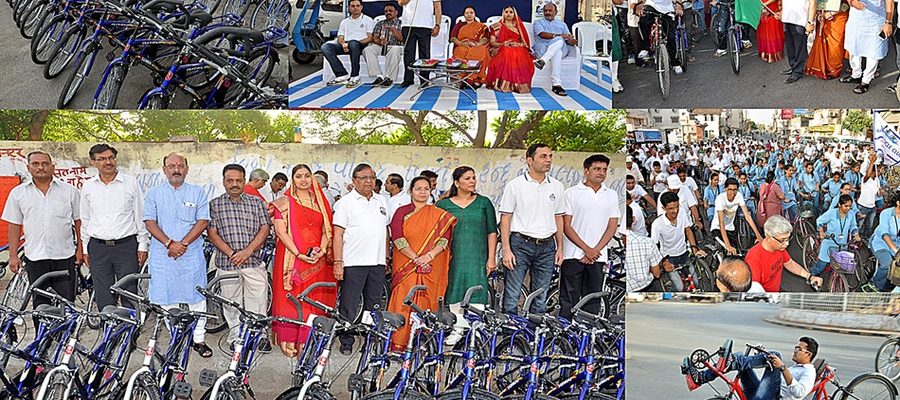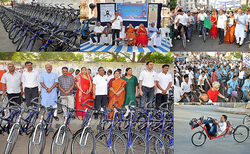Rajkot's journey towards low carbon, sustainable development

Rajkot city of Gujarat state in western India has always been in limelight for its bold and innovative steps towards sustainable growth. It is the regional and local leadership of this fast developing city that has brought several accolades to the city in arenas such as sanitation and cleanliness, industrial development and other contemporary aspects such as adoption of renewable energy, building energy efficiency, efficient transport system and use of non-motorised transport.
For the past few years, the city has been participating in many programmes and projects funded through Government of India or by prominent development organisations like the British High Commission and the US Department of State, which not only strengthen the institutional capacity of the city but also enable it to learn from relevant global activities and practices.
Rajkot’s participation in the Urban LEDS project along with 36 other cities from different countries has been a landmark in terms of mainstreaming climate consideration into planning and policy actions of the local government. They have adopted various tools and resources for strengthening internal capacity, providing innovative financial solutions, peer learning and global networking. The mainstreaming of low emission development into the planning and policy actions of local government is a key directive of the Urban-LEDS project. Mainstreaming implies that climate considerations should no longer be dealt with by a single department or person in the local government; rather, they should be embedded throughout all policies, strategies, and practices.
To facilitate the mainstreaming of low emission urban development, the Urban-LEDS project has used ICLEI’s GreenClimateCities (GCC) methodology, engaging all concerned external agencies and departments within the local government, to develop integrated low emission development strategies, in line with national ambitions and targets.
Rajkot’s priority actions
A well-defined and sufficiently empowered “Core Climate Team” and “Stakeholder Committee” were established within Rajkot Municipal Corporation (RMC), with representation from various departments and various external organisations, with the Commissioner as its Chairman. The Municipal Commissioner led the process of action planning, prioritization and facilitated implementation of low emission development interventions as Chairman of the Core Climate Team and Stakeholder Committee. Continuous engagement of internal and external stakeholders along with leadership from the RMC has ensured clear understanding of roles, fostered collective ownership and active participation, and ensured that local priorities are identified and addressed, and enabled coordinated planning and action.
• Under the Urban LEDS project, the city has prepared its city level energy and greenhouse gas (GHG) inventory for the years 2009-10 to 2012-13. Priority areas and possible low emission interventions were subsequently identified through discussions held with the Core Climate Team and key stakeholders and some key projects were prioritized by the City for pilot implementation using Urban-LEDS grants. Construction of DTS system, replacement of High-Pressure Sodium Vapour (HPSV) street lighting with LED lights and installation of solar rooftop photovoltaic system in a municipal school, were selected for demonstration under the Urban LEDS project.
• About 40 percent of the city is not connected to the existing sewage network. In such cases, untreated sewage is discharged into the Aji River, posing ecological harm to the surrounding communities and biodiversity. At present, the large-scale centralized sewage treatment system in Rajkot lacks sufficient capacity to treat all the domestic wastewater generated. However, to provide the city with an ecologically sustainable solution vis a vis centralized treatment systems, which also contributes to reducing GHG emissions through avoided emissions and commensurate fuel switch to biogas, generated during the treatment process, a Decentralised wastewater Treatment Systems (DTS) was designed and implemented in the Jilla Garden neighbourhood. Today, the system treats sewage from 236 households, saving 4,000 kilowatt hours of electricity and 15 tonnes of carbon dioxide equivalent per year. It also generates 8,212 cubic metres of biogas per year, which can be used for thermal applications like cooking. The treated wastewater from DTS is used for irrigating the adjacent garden, thereby reducing the use of piped water.
• Replacement of 291 HPSV street lights with LED street lights on selected roads of Rajkot has also been undertaken for better illumination, improved safety and lower energy consumption. This intervention has helped in improvement of illumination levels from 7 lux to 25 lux, potential electricity saving of 70,000 kilowatt hours and reducing GHG emission by 59.83 tonnes carbon dioxide equivalents (tCO2e) per year.
• RMC has initiated a public cycle sharing pilot project in four prime locations (five cycles in each location) of the city. More than 25 hotels have also made cycles available for their guests. Also, 60 cycles in all 18 BRTS stations and 15 cycles in corporation zonal offices are available on a rental basis, which are being used by more than 700 people per week. After the significant response to the pilot public cycle sharing scheme, prefeasibility study and business plan for public bicycle sharing system in Rajkot city has been prepared under Urban-LEDS project to strengthen non-motorised transport (NMT) system and accelerate a shift towards sustainable transport modes. It is intended to implement this project in a phased manner. Successful implementation of plan will help Rajkot city to reduce its fuel consumption of 867 kilolitres and GHG emission by 2072 tonnes carbon dioxide equivalents per year.
The three pilot projects implemented in Rajkot city under Urban LEDS have resulted in an annual electricity savings of 1,06,629 kWh and reduced emissions by approximately 100 tCO2e per year. In addition to implementing the above pilot projects, the city, with technical assistance from ICLEI Local Governments for Sustainability South Asia, has also prepared the Low Emission Development Strategies (LEDS) in consultation with the Core Climate Team and Stakeholder Committee constituted under the project. The cumulative potential GHG emission reduction from the actions proposed across the various sectors for the community and municipal operations stands at 4,51,825 tCO2e, aggregating to about 25 percent of Rajkot City’s baseline annual GHG emissions in the year 2012-13. Low Emission Development Strategy (2019-20) has already been approved by the municipal commissioner and an approval is being sought from the City Legislative Council.
More impact
The primary aspects on which the LEDS has been prepared for the city deal with identifying priority areas and upscaling the efforts put in the implementation of pilot projects. Based on successful implementation and as an outcome of the pilot projects, RMC has taken initiatives to replicate such projects in their planning process as part of their Low Emission Development Action Plan.
The successful implementation of the DTS has encouraged Rajkot to approve the technology for future implementation in treating untreated sewage, which is polluting the Aji River. As per the recently formulated General Development Control Regulations of Development Plan 2031 in Rajkot, implementation of DTS plants for new buildings is mandatory for securing an occupancy certificate, in case of high-rise buildings, with more than 100 units or with area in excess of 20,000sq.mt. The city has made a budgetary allocation of about Rs 53 crore in the municipal budget of 2016-17, for replicating and scaling up the systems.
RMC has also taken an initiative and invited communities to take part in planning process and implementation of environment friendly project in their community through SMART Society Scheme. About 115 civic societies in Rajkot were nominated eligible for “Smart Societies” development, and are encouraged to adopt the DTS technology, to reduce the load on the existing STP. These societies generate 11.2 MLD of raw sewage. Deploying the DTS technology has the potential to save 0.44MU electricity per year and 1,715 tCO2e GHG emission reductions. It also has the potential to generate 9,44,437 m3 of biogas per year, which can replace 453,330 kg of LPG. As an up scaling strategy Rajkot city also plans to select 100 such societies each year and to use the network for wider implementation.
Following the successful replacement of 291 number of HPSV streetlights with LED lights, it has been proposed to replace all 52, 000 HPSV lights in the City by adapting ESCo model. Budget provision has been made in Rajkot Municipal Administrative budget, 2016-2017. The implementation will result in annual electricity savings of 6.26 MU and reduces GHG emission by 5,146 tCO2e.
The introduction of net metering in Gujarat Solar Power Policy has resulted in an increase in adoption increase in roof top SPV. Following the successful implementation of 20kWp SPV system in RMC municipal school, RMC is installing 175 kWp SPV systems on various municipal buildings. The implementation would result in annual electricity savings of 0.26 MU and reduces GHG emissions by 215 tCO2e per year.
Therefore, it is clear that for Rajkot, community engagement and awareness, along with visionary leadership from the administration and a strong understanding of the opportunities and challenges of delivering municipal services, have paved the ways for development that is truly sustainable.




